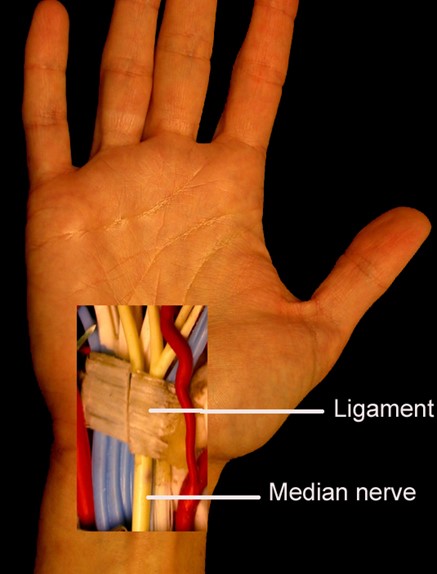CARPAL TUNNEL SYNDROME
A Fact Sheet by Dr Randy Bindra,
Orthopaedic surgeon at Gold Coast Private Hospital

Does your hand hurt after use? Do you suffer cramping of the thumb or tingling in the fingers? It is easy to dismiss such pain as a symptom of ageing or blame it on arthritis but carpal tunnel syndrome can cause vague aches and tiredness in the hands, especially for people older than 50. Fortunately, it can also be resolved with surgery in most cases.
What is carpal tunnel syndrome?
Carpal tunnel syndrome (CTS) is a condition of the hand caused by irritation of the median nerve at the wrist. It is characterised by pain, tingling, numbness and weakness, with the nerve becoming compressed by swelling of the surrounding tendons or narrowing of the bony tunnel from arthritis. While the exact cause cannot usually be identified, CTS has been known to be associated with pregnancy, diabetes, obesity, smoking and hormonal problems.
 What are the symptoms of CTS?
What are the symptoms of CTS?
Symptoms include a feeling of tingling in the fingers, most commonly the long, index and thumb, along with aching and pain shooting up the arm and the feeling of the hand or arm ‘going to sleep’. People can drop items or have difficulty grasping small objects, while a loss of sensation or weakness in the hand is seen in long-standing cases and indicates nerve damage. One of the hallmarks of CTS is waking up at night with ‘pins and needles’ in the hand.
Who should I see if I’m concerned?
Consult your GP, who will be able to establish the diagnosis and rule out other conditions. You will then be referred to a specialist hand surgeon for further examination and to discuss treatment.
How is CTS diagnosed?
A specialist will examine your wrist and hand and usually be able to diagnose CTS in the clinic. Nerve conduction tests are often required to confirm the diagnosis and establish the severity of nerve involvement.
How can CTS be treated?
Modifying daily activities can be helpful in early stages, such as reducing repetitive movements or avoiding tasks that place a lot of strain on the wrists. Initial treatment involves anti-inflammatory medication to reduce the swelling in the wrist and thereby relieve pressure on the nerve. A wrist splint helps immobilise the wrist and minimise symptoms at night, while a steroid injection into the carpal tunnel is often helpful in early stages or when related to conditions such as pregnancy.
Will I need to have surgery?
Surgery is the most successful treatment for persistent cases of CTS, with success rates from 80-90 per cent. The ligament at the roof of the tunnel is carefully released to reduce pressure on the underlying nerve and, in most cases, surgery can be done under a local anesthetic with sedation and does not require an overnight stay in hospital.
How long is recovery after surgery?
You will need some assistance for the first two weeks after surgery while you keep the dressings clean and dry. Following this, you will be able to resume most of your normal activities and return to light work as tolerated. It can take up to three months to regain full strength in your hands and for unrestricted movement if your job is physically demanding.
What if I leave CTS untreated?
Untreated CTS can cause permanent damage to the median nerve, which will result in thumb muscle weakness and impaired feeling in the hand. In such cases, results of surgery are less satisfactory.
Can CTS be prevented?
CTS symptoms can be minimised by taking frequent rest breaks, maintaining a good posture, working within your limitations and conditioning yourself to repetitive work. However, if you suspect you have symptoms of CTS, it is important to prevent permanent damage to the nerve by seeking early medical attention.
This Fact Sheet is courtesy of Dr Randy Bindra, an orthopaedic hand surgeon at Gold Coast Private Hospital. It is a general information guide and not intended to replace medical advice from your doctor. If you suspect you have carpal tunnel syndrome, you must seek early professional advice.
For more information, phone 07 5530 0770 or email info@randybindra.com.au
DR RANDY BINDRA
Hand, Wrist and Nerve Surgeon
MBBS, FRACS, FRCS, MSOrth, MChOrth, FAOrthA
Professor Bindra’s specialties include:
- Wrist fractures from falls, work-related injuries and multiple fracture injuries from severe trauma
- Corrective surgery for fractures that have not healed optimally
- Keyhole surgery for early arthritis and joint replacement surgery for advanced cases
- Nerve disorders such as carpal and cubital tunnel syndrome
- Microsurgery for nerve repair and poor circulation of the hand
- Replanting amputated digits following trauma
- Childhood problems present at birth or developing with growth
- Restoring function in children with cerebral palsy using Botox injections and surgery if needed
- Collagenase injections for treating Dupuytren’s contracture
For more information, contact:
Dr Randy Bindra
Gold Coast Private Hospital Specialist Suites
Gold Coast Private Hospital
14 Hill St, Southport, Qld 4215
T: 07 5530 0770
F: 07 5530 0687
E: info@randybindra.com.au
W: www.randybindra.com.au
